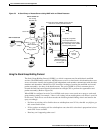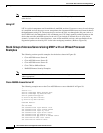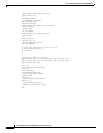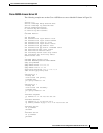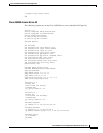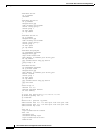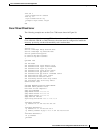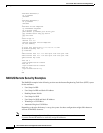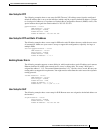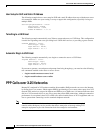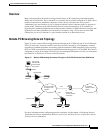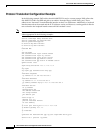
Telco and ISP Dial Scenarios and Configurations
PPP Calls over X.25 Networks
DNC-330
Cisco IOS Dial Services Configuration Guide: Network Services
User Setup for SLIP and Static IP Address
The following example shows a user setup for SLIP and a static IP address that stays with the user across
all connections. Make sure your routing is set up to support this configuration, especially for large or
multiple POPs.
staticallyslipme Password = "cisco"
Service-Type = Framed,
Framed-Protocol = SLIP,
Framed-IP-Address = 1.1.1.13
Telnetting to a UNIX Host
The following example automatically uses Telnet to connect the user to a UNIX host. This configuration
is useful for registering new users, providing basic UNIX shell services, or providing a guest account.
telnetme Password = "cisco"
Service-Type = Login,
Login-Service = Telnet,
Login-IP-Host = 4.1.1.1
Automatic Rlogin to UNIX Host
The following example automatically uses rlogin to connect the user to a UNIX host:
rloginme Password = "cisco"
Service-Type = Login,
Login-Service = Rlogin,
Login-IP-Host =4.1.1.2
If you want to prevent a second password prompt from being brought up, you must have the following
two commands enabled on the router or access server:
• rlogin trusted-remoteuser-source local
• rlogin trusted-localuser-source radius
PPP Calls over X.25 Networks
Remote PCs stationed in X.25 packet assembler-disassembler (PAD) networks can access the Internet
by dialing in to Cisco routers, which support PPP. By positioning a Cisco router at the corner of an X.25
network, ISPs and telcos can provide Internet and PPP access to PAD users. All remote PAD users that
dial in to X.25 networks dial in to one Cisco router that allows PPP connections. Although connection
performance is not optimal, these X.25 to PPP calls utilize installed bases of X.25 equipment and cost
less to operate than connecting over the standard telephone network.
Note This dial-in scenario can also be used as an enterprise solution. In this case, an enterprise
consults with a third-party service provider that allows enterprises to leverage exiting X.25
enterprise equipment to provide connections back into enterprise environments.



